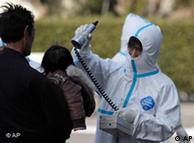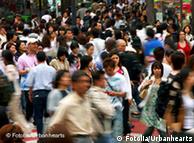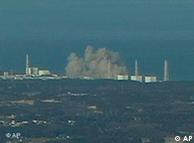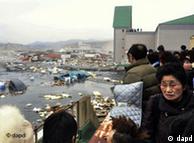Radiation poses health risk in Japan after two new blasts
Radioactivity levels increased rapidly in Japan on Tuesday as two new explosions hit reactors at the country's earthquake-damaged Fukushima nuclear power complex, the third and fourth blasts since Saturday.
"There is no doubt that unlike in the past, the figures are the level at which human health can be affected," said chief government spokesman Yukio Edano.
Edano said that radiation levels on Tuesday morning were 30 millisieverts between the Number 2 and Number 3 reactors, 400 millisieverts near the Number 3 and 100 millisieverts near Number 4.
A single dose of 1,000 millisieverts - or one sievert - causes temporary radiation sickness, such as nausea and vomiting. A dose of five sieverts is enough to kill about half of those people exposed to it within a month.
Radiation levels were recorded at 40 times normal levels in Saitama, near the capital Tokyo, while "minute levels" of radiation were detected in the capital, according to Kyodo news agency, quoting the metropolitan government.
Two new explosions
Between 6:00 a.m. (2100 GMT Monday) and 6:15 a.m. an explosion hit the Number 2 reactor of Fukushima Dai-ichi nuclear power plant, a Tokyo Electric Power Co. (TEPCO) spokesman said. By 8:31 a.m., radiation levels there had exceeded eight times the legal limit for exposure in one year.
In a televised address, Japanese Prime Minister Naoto Kan told the nation there had "been a fire at the Number 4 reactor" and that radiation levels in the surrounding area had "heightened significantly."
Kan implored people within 30 kilometers (18 miles) of the site to remain indoors and urged them not to panic.
"We are making every effort to prevent the leak from spreading," he said. "I know that people are very worried but I would like to ask you to act calmly."
The fire has reportedly been extinguished since the prime minister's announcement, according to Japanese media, but the International Atomic Energy Agency, IAEA, said later that it had been told by Japan that a spent fuel storage pond at the reactor was on fire and that radioactivity had been released into the atmosphere.
The French embassy in Tokyo has warned that low-level radioactive winds could reach the capital within 10 hours. Winds were blowing in a southwesterly direction toward Tokyo but shifted to the east and out to sea later on Tuesday.
Radiation levels in the city of Maebashi, 100 kilometers north of Tokyo, were up 10 times normal on Tuesday, Kyodo new agency quoted the city government as saying.
The head of France's nuclear safety authority, Andre-Claude Lacoste, said Japanese officials had briefed him, saying the concrete vessel around the Number 2 reactor at Fukushima was no longer sealed.
Lacoste also said that the Fukushima accident now rated a six on the international seven-point scale of severity, up from four, putting it second to the Chernobyl disaster in Ukraine and ahead of Three Mile Island in the US state of Pennsylvania as the world's worst nuclear accidents.
Japanese markets reacted to the news on Tuesday with the Nikkei Index plunging some 13 percent. The steep decline in share prices over the last two days has wiped some $720 billion (517 billion euros) off the market.
Ongoing crisis
There have been a total of four explosions at the Fukushima nuclear power complex in northeastern Japan since it was damaged in Friday's massive earthquake and tsunami. The most recent were blasts at reactors Number 2 and 4 earlier on Tuesday.
A hydrogen blast at the plant's Number 3 reactor on Monday followed a Saturday blast at reactor Number 1.
Authorities had previously been trying to prevent meltdowns in the Fukishima complex's nuclear reactors by flooding the chambers with sea water to cool down the reactors.
Experts say Japan's current nuclear disaster is the world's worst since the 1986 Chernobyl meltdown in Ukraine.
Meanwhile, the full extent of the damage from the 9.0-scale earthquake and the resulting tsunami that destroyed the northeastern Miyagi prefecture were still becoming clear. Officials say at least 10,000 people were killed as a result of the quake, the world's fourth most powerful since 1900.
Officials also say they believe tens of thousands remain missing. About 850,000 homes in northern Japan remained without electricity Tuesday in near-freezing weather, according to Tohuku Electric Power Co. According to Tokyo, at least 1.5 million homes are without running water.
Authors: David Levitz, Gregg Benzow (AP, dpa, Reuters)
Editor: Nancy Isenson





No comments:
Post a Comment